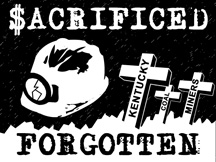Mine Safety
Safer Union Mines

Studies show that union mines are much safer than non-union mines. A May 2011 report from the John M. Olin Program in Law and Economics at Stanford University found a "substantial and significant decline in traumatic mining injuries and fatalities" at underground mines where the United Mine Workers of America represented workers.
The report found that over two decades there were:
- between 18 and 33 percent fewer traumatic injuries at union mines, compared to non-union operations;
- between 27 to 68 percent fewer fatal accidents at union mines (the range in figures accounts for possible statistical variations because of small sample sizes).
Need a Lawyer?
If you are a coal miner and need legal representation on a mine safety issue, we suggest you contact:
Wes Addington
Appalachian Citizens Law Center
317 Main Street
Whitesburg, Ky 41858
606-633-3929
[email protected]
OR
Tony Oppegard
Attorney-At-Law
P.O. Box 22446
Lexington, Ky 40522
859-948-9239
[email protected]
 Above all else, coal companies should be diligent about the safety of their workers and the conditions inside their mines. Officials responsible for enforcing mine safety laws should do so wihout interference. And elected leaders should strengthen those laws when the need is clearly demonstrated.
Above all else, coal companies should be diligent about the safety of their workers and the conditions inside their mines. Officials responsible for enforcing mine safety laws should do so wihout interference. And elected leaders should strengthen those laws when the need is clearly demonstrated.
Unfortunately, none of this happens as it should.
An examination of 320 coal mine deaths from 1996 to 2005 by Ken Ward Jr. of the Charleston Gazette found that 91 percent of those deaths could be traced to a serious safety violation, including not performing required safety checks, poorly maintained equipment, roof control and ventilation violations, and inadequate training.

The disaster that killed 29 miners at the Upper Big Branch Mine in West Virginia in April 2010 reminds us that not enough has changed since Ward's report. Yet legislation to address some of the enforcement issues brought to light by this tragedy is stalled in the U.S. Congress.
KFTC has established this space to provide news, analysis and opinions about mine safety issues. We'll update the list below as new articles and reports become available.
Health Care at Risk for 12,000 Retired Miners and Their Families
Peabody Energy, the nation’s largest coal company, is seeking release from a pledge to pay into a health insurance fund.
Johns Hopkins Defies Senator Over Black Lung Probe
The CEO of Johns Hopkins Medicine has turned down U.S. Sen.
Land Reform Committee Meeting
KFTC Land Reform Committee meeting are help ever other month and are a time for Land Reform Committee members to come together to review, evaluate and develop strategies to achieve the specific goals the committee has established.
The meeting are open to all KFTC members.
Coal's costs keep adding up
How many more examples do we need of coal operators' lawlessness, aided and abetted by government apathy or impotence?
Coal Mines Keep Operating Despite Injuries, Violations And Millions In Fines
A joint investigation by NPR and Mine Safety and Health News found that thousands of mine operators fail to pay safety penalties, even as they continue to manage dangerous — and sometimes deadly — mining operations. Most unpaid penalties are between two and 10 years overdue; some go back two decades. And federal regulators seem unable or unwilling to make mine owners pay.
Page
- Home
- |
- Sitemap
- |
- Get Involved
- |
- Privacy Policy
- |
- Press
- |
- About
- |
- Bill Tracker
- |
- Contact
- |
- Links
- |
- RSS

